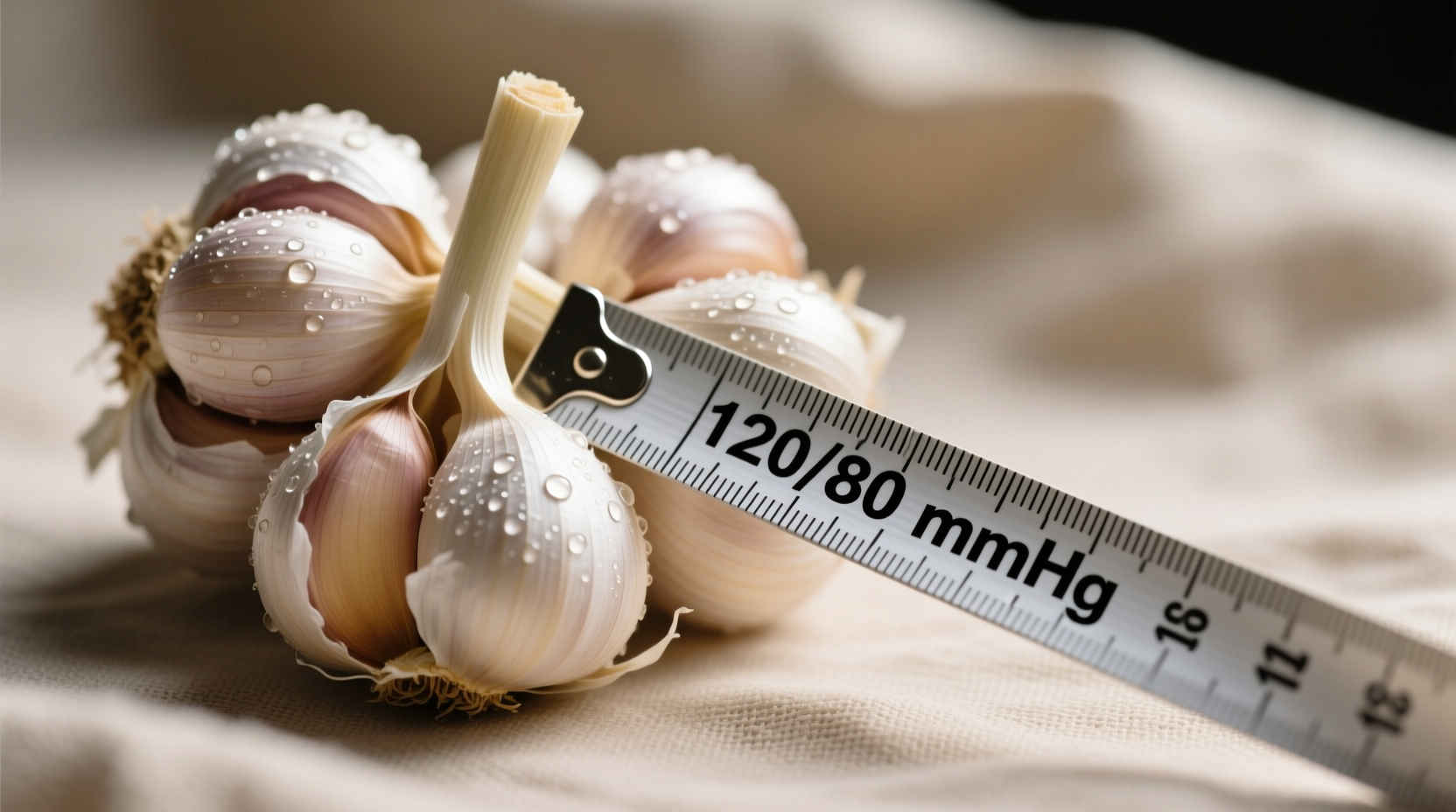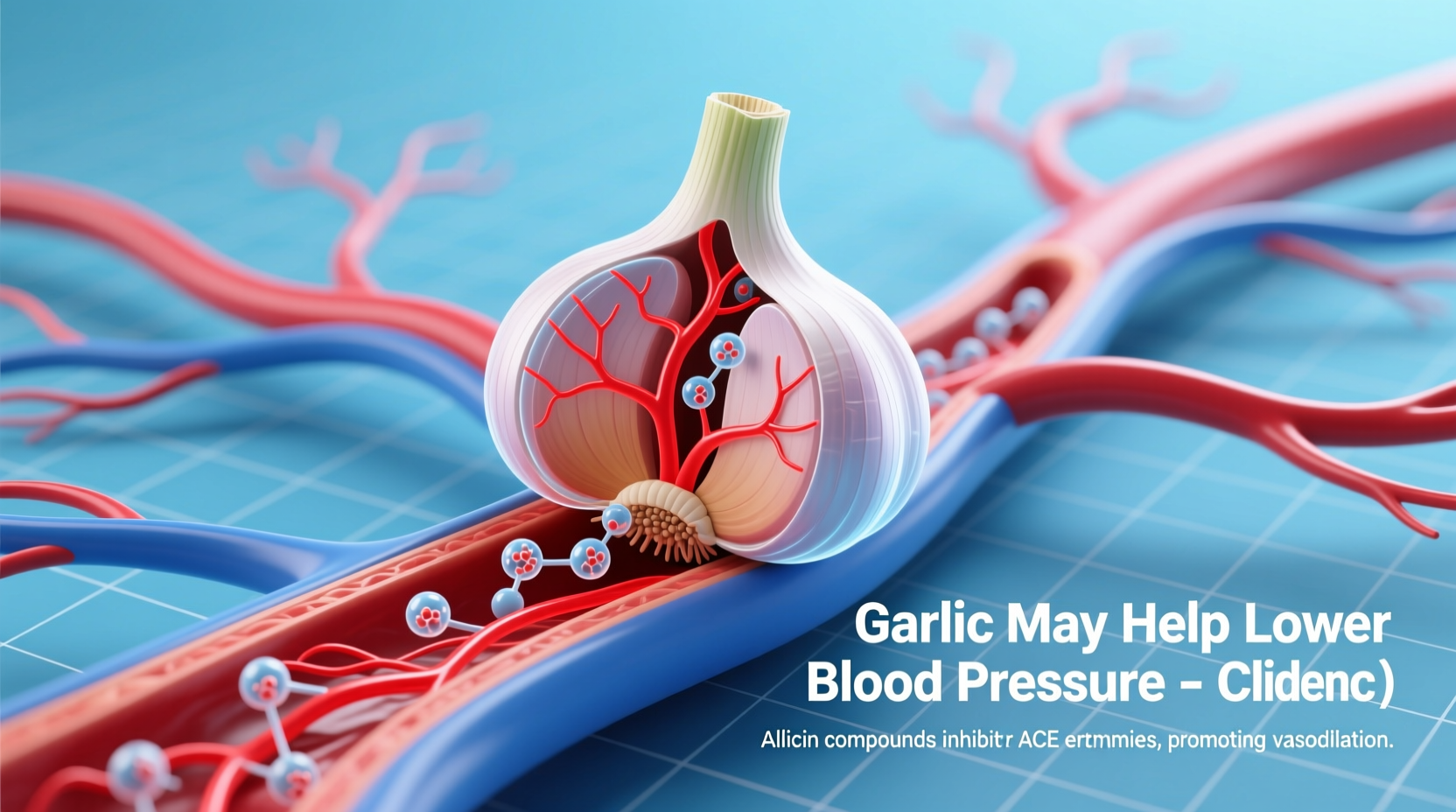Garlic has been used for centuries in traditional medicine systems worldwide, but modern science is now validating some of its cardiovascular benefits. As someone who's spent years researching the science behind culinary ingredients, I've seen how ancient wisdom sometimes aligns with contemporary research - but with important nuances that matter for your health decisions.
How Garlic Might Influence Blood Pressure
When you crush or chop garlic, an enzyme called alliinase converts alliin into allicin - the compound responsible for garlic's distinctive smell and many of its biological effects. Allicin then breaks down into other sulfur-containing compounds that appear to:
- Promote nitric oxide production, which relaxes blood vessels
- Reduce oxidative stress in the cardiovascular system
- Decrease arterial stiffness through hydrogen sulfide pathways
- Exhibit mild ACE-inhibiting properties similar to some blood pressure medications
These mechanisms work together to potentially improve blood flow and reduce pressure on arterial walls. However, the actual impact depends heavily on the form of garlic consumed and individual physiology.
What Clinical Evidence Actually Shows
A comprehensive 2020 meta-analysis published in Experimental and Therapeutic Medicine reviewed 12 randomized controlled trials involving 553 participants. The analysis revealed:
| Garlic Form | Average Systolic Reduction | Average Diastolic Reduction | Study Duration |
|---|---|---|---|
| Aged Garlic Extract | 7.2 mmHg | 4.8 mmHg | 2-3 months |
| Raw Garlic | 4.6 mmHg | 2.9 mmHg | 4-12 weeks |
| Garlic Powder | 5.1 mmHg | 3.3 mmHg | 1-3 months |
These reductions are meaningful but modest compared to prescription medications, which typically lower systolic pressure by 10-15 mmHg. The National Center for Complementary and Integrative Health (NCCIH) notes that garlic's effects appear most pronounced in people with existing hypertension, with minimal impact on those with normal blood pressure readings.

Practical Considerations for Blood Pressure Support
If you're considering adding garlic to support healthy blood pressure levels, these evidence-based recommendations can help you make informed choices:
Choosing the Right Form
Not all garlic products deliver the same benefits. Research suggests:
- Aged garlic extract (Kyolic brand in many studies) shows the most consistent results due to stable sulfur compounds
- Raw garlic requires proper preparation - crush and let sit for 10 minutes before consuming to maximize allicin formation
- Garlic supplements vary widely in quality - look for products standardized to alliin or allicin potential
Dosage and Timing Guidelines
Based on clinical trials showing positive effects:
- For aged garlic extract: 600-1,200 mg daily, divided into 2-3 doses
- For raw garlic: 1-2 cloves daily, preferably consumed with food to reduce gastrointestinal effects
- Consistency matters - effects typically become noticeable after 8-12 weeks of regular use
Important Limitations You Should Know
While garlic shows promise as a complementary approach, several critical limitations affect its real-world effectiveness:
Individual Response Variability
Genetic factors significantly influence how your body processes garlic compounds. Research from the American Journal of Clinical Nutrition indicates that approximately 30% of people show minimal blood pressure response to garlic supplementation due to variations in sulfur metabolism pathways.
Not a Replacement for Medical Treatment
The American Heart Association emphasizes that garlic should never replace prescribed blood pressure medications for individuals with hypertension. At best, it may serve as a complementary approach alongside conventional treatment and lifestyle modifications.
Potential Medication Interactions
Garlic can interact with several common medications:
- Increases bleeding risk when taken with anticoagulants like warfarin
- May enhance effects of HIV protease inhibitors
- Potentially reduces effectiveness of some birth control pills
- Can lower blood sugar too much when combined with diabetes medications
Always consult your healthcare provider before adding garlic supplements if you take any prescription medications.
Integrating Garlic Into Your Blood Pressure Management Plan
For those interested in incorporating garlic as part of a comprehensive approach to blood pressure management, consider these practical strategies:
- Combine garlic with other evidence-backed dietary approaches like the DASH diet
- Use fresh garlic in cooking rather than relying solely on supplements for broader nutritional benefits
- Pair with regular physical activity - research shows exercise and garlic may have synergistic effects
- Monitor your blood pressure regularly to track any changes
Remember that no single food or supplement can overcome poor lifestyle habits. The most significant blood pressure improvements come from comprehensive approaches that include dietary patterns, physical activity, stress management, and appropriate medical care when needed.
Frequently Asked Questions
How long does it take for garlic to lower blood pressure?
Most clinical studies show measurable effects after 8-12 weeks of consistent daily use. The 2020 meta-analysis in Experimental and Therapeutic Medicine found that significant reductions typically appear around the 2-month mark, with maximum benefits seen at 3 months of regular supplementation.
Is raw garlic better than supplements for lowering blood pressure?
Research suggests aged garlic extract supplements generally produce more consistent results than raw garlic. A study published in Integrated Blood Pressure Control found that aged garlic extract provided more stable blood levels of active compounds compared to raw garlic, which varies significantly based on preparation method and individual digestion.
Can garlic replace my blood pressure medication?
No, garlic should never replace prescribed blood pressure medication. The American Heart Association states that while garlic may provide modest additional benefits, its effects are significantly less than prescription medications. Always consult your healthcare provider before making any changes to your medication regimen.
What's the best time of day to take garlic for blood pressure?
Research doesn't indicate a specific optimal time, but taking garlic with meals may reduce potential gastrointestinal side effects. Some studies suggest splitting the daily dose (morning and evening) provides more consistent blood levels of active compounds compared to a single daily dose.
Are there any side effects of using garlic for blood pressure?
Common side effects include bad breath, body odor, heartburn, and gastrointestinal discomfort. More serious concerns include increased bleeding risk, especially when combined with blood-thinning medications. The European Medicines Agency notes that high doses (over 2,400 mg daily) may cause dizziness or muscle aches in some individuals.











 浙公网安备
33010002000092号
浙公网安备
33010002000092号 浙B2-20120091-4
浙B2-20120091-4